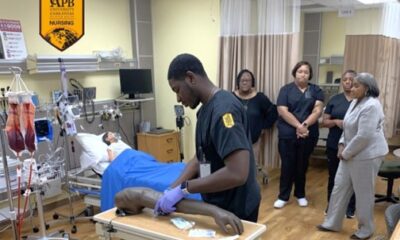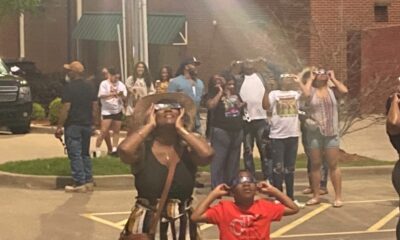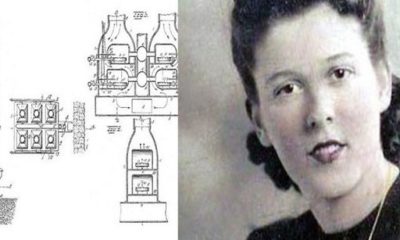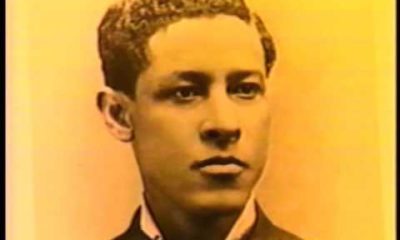Elections 2012
Politics Past and Present: Historian Picks Seven Convention Moments Significant for African-Americans and the Nation


Janus Adams is Emmy Award-winning journalist as well as an author/historian, talk show host, publisher/producer, and creator of BackPax children’s media.
Janus Adams was destined to be a lifelong student of history and culture. At age eight, in the wake of the landmark Brown v. Board of Education school desegregation decision, she was one of four children selected to end de facto segregation in New York.
Adams is the author of Freedom Days: 365 Inspired Moments in Civil Rights History and Glory Days: 365 Inspired Moments in African-American History, as well as other books for adults and the BackPax series for children.
TheVillageCelebration invited Adams to share her choices for political convention highlights throughout history.
2008
Thinking of key moments in national convention history, the greatest turning point would be the appearance of Senator Barack Obama at the Democratic National Convention in Denver. On August 28 he became the first African-American to win his party’s presidential nomination. The date is doubly significant: it also marked the 45th anniversary of the March on Washington.
But that moment in 2008 could not have come without these milestones en route:
2000
When Colin Powell took to the Republican Party Convention podium in Philadelphia on July 31, the retired general and former chairman of the Joint Chiefs of Staff was the man who should be president. But for race, he would have been his party’s likely nominee. On camera, one delegate was seen to mouth: “over my dead body.”
1988
Even today, my children recall the night of July 19, when I kept them up past midnight for Jesse Jackson’s speech to the 1988 Democratic Convention in Atlanta. With party leaders keeping him out of their primetime lineup, thousands stayed up that night “for Jesse.” He’d put his life on the line for us. Indeed, 1988 marked the first time an African-American was seen as a long shot—yes–but viable, too. Winning Michigan with 55% of the vote, he was, for a time, the Democratic frontrunner.
1972
Asked to name their “shero,” progressive women of the 1970s named Shirley Chisholm. On July 13, when the roll was called at the Democratic National Convention in Miami Beach, Chisholm actually won 151 delegate votes. The year before, 300 women had gathered in Washington, DC, founding the National Women’s Political Caucus and urging women to run for office. That’s when Chisholm–the first Black woman elected to congress–announced her candidacy for president.
1964
On August 26, Fannie Lou Hamer, Robert Moses, and the Mississippi Freedom Democratic Party marched onto the Democratic National Convention floor in Atlantic City with borrowed passes. For four days, party bosses blocked their way. Now, with television cameras rolling, Mrs. Hamer had her say. “If the MFDP is not seated now, I question America.” The MFDP was not seated; instead, the Party accepted an all-White slate of delegates elected in white primaries that barred blacks.
1952
At its convention in Chicago, the Progressive Party unanimously selected Charlotta Bass – editor and publisher of the California Eagle (the oldest Black newspaper in the West) – as its vice-presidential nominee.
“It is a great honor to be chosen a pioneer,” she said. “The $8 billion being spent to rearm Europe and crush Asia could rehouse all my people living in the ghettos of … every large city in the nation. We fight that all people shall live.”
1872
At a time when women in the United States could not vote, Victoria Woodhull became the first woman to run for president. But, the Equal Rights Party New York convention’s real surprise came on June 6. After ratifying her nomination, the party chose Frederick Douglass as her running mate.
A self-emancipated slave, Underground Railroad conductor, and journalist/publisher, Douglass wasn’t at the convention and didn’t know he’d been nominated.
What’s your favorite convention moment in history? Please tell us in the comments section.
Photo: Courtesy of Janus Adams

-

 Featured12 months ago
Featured12 months agoArkansas Sheriff Who Approved Netflix Series Says He Stayed ‘In His Lane’
-

 HBCUS12 months ago
HBCUS12 months agoSenator Boozman Delivers $15 Million to Construct New UAPB Nursing Building
-

 News12 months ago
News12 months agoMillions In the Path of The Total Solar Eclipse Witnessed Highly Anticipated Celestial Display
-

 Featured9 months ago
Featured9 months agoCalifornia Is the First State to Create A Public Alert for Missing Black Youth
-

 Featured9 months ago
Featured9 months agoAfrican American Leaders Stay the Course Amid Calls for President Biden To Bow Out of Race
-

 Featured9 months ago
Featured9 months agoThe Debate Fallout Lands on Both Candidates









